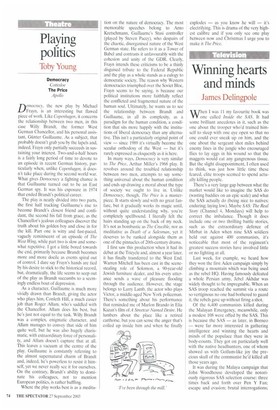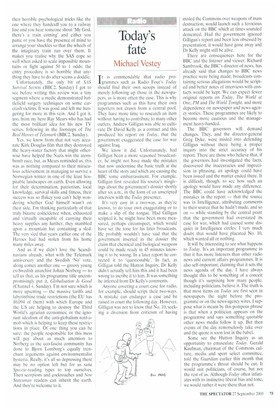Winning hearts and minds
James Delingpole When I was 11 my favourite book was one called Inside the SAS. It had some brilliant anecdotes in it, such as the one about the trooper who'd trained himself to sleep with one eye open so that no one could ever sneak up on him, and the one about the sergeant shot miles behind enemy lines in the jungle who encouraged flies to lay eggs in his wound so that the maggots would eat any gangrenous tissue. But the slight disappointment, I often used to think, was just how little time these feared, elite troops seemed to spend actually killing people.
There's a very large gap between what the market would like to imagine the SAS do (wasting baddies on an epic scale) and what the SAS actually do (being nice to natives; enduring; laying low). Maybe SAS: The Real Story (Channel 4, Mondays) will help to correct the imbalance. Though it does include one or two thrilling battle stories, such as the extraordinary defence of Mirbat in Aden when nine SAS soldiers held out against 400 communists, it's noticeable that most of the regiment's greatest success stories have involved little or no fighting at all.
Last week, for example, we heard how they won the first Aden campaign simply by climbing a mountain which was being used as the rebel HQ. Having famously defeated a whole Persian army, Jebel Aldidar was widely thought to be impregnable. When an SAS troop reached the summit via a route so vertiginous no one had bothered to guard it, the rebels gave up without firing a shot.
Of the 6,400 communists killed during the Malayan Emergency, meanwhile, only a modest 108 were offed by the SAS. This is because the SAS — as later, in Borneo — were far more interested in gathering intelligence and winning the hearts and minds of the populace than they were in body-counts. They got on particularly well with the native headhunters, one of whom showed us with Gollum-like joy the precious skull of the communist he'd killed all those years ago.
It was during the Malaya campaign that John Woodhouse developed the notoriously rigorous SAS selection course: three times back and forth over Pen Y Fan; escape and evasion; brutal interrogations; then horrible psychological tricks like the one where they handcuff you to a railway line and you hear someone shout 'My God, there's a train coming' and either you panic or you have the presence of mind to arrange your shackles so that the wheels of the imaginary train run over them. It makes you realise why the SAS cope so well when asked to scale impossible mountains or fight against 50 to 1 odds: the entry procedure is so horrible that anything they have to do after seems a doddle.
Unfortunately, the only bit of SAS Survival Secrets (BBC2, Sunday) I got to see before writing this review was a tiny segment where a medic demonstrated battlefield surgery techniques on some carcrash victims. It was good and left me hungering for more in this vein. And I got it, too, from my hero Ray Mears who has had the most brilliant idea for his new TV series, following in the footsteps of The Real Heroes of Telemark (BBC2, Sunday).
Yes, we know from that not very accurate Kirk Douglas film that they destroyed the heavy-water factory that might otherwise have helped the Nazis win the atombomb race, but, as Mears reminded us, this was as nothing compared to their miraculous achievement in managing to survive a Norwegian winter in one of the least hospitable landscapes on earth. Even allowing for their determination, patriotism, local knowledge. survival skills and fitness, their success was so flukey you can't help wondering whether God himself wasn't on their side. I'm thinking particularly of that truly bizarre coincidence when, exhausted and virtually incapable of carrying their heavy supplies any further, they stumbled upon a mountain hut containing a sled. The very sled that years earlier one of the Heroes had had stolen from his home many miles away.
And as if we didn't love the Scandinavians already, what with the Telemark anniversary and the Swedish 'No' vote, along comes another one — groovy young ex-Swedish anarchist Johan Norberg — to tell us that, as his programme title uncompromisingly put it, Globaisation Is Good (Channel 4. Sunday). I'm not sure which is more upsetting — the massive tariffs and labyrinthine trade restrictions (the EU has 10,094 of them) with which Europe and the US are helping to destroy the Third World's agrarian economies; or the ignorant idealism of the anti-globalism rent-amob which is helping to keep these restrictions in place. Of one thing you can be sure: the people responsible for this mess will pay about as much attention to Norberg as the eco-fascist community has done to Bjorn Lomborg's equally trenchant arguments against environmentalist hysteria. Really, it's all so depressing there may be no option left but for us sane Speccie-reading types to top ourselves. Then scorpions and cockroaches and New Statesman readers can inherit the earth. And they're welcome to it.



























































































 Previous page
Previous page